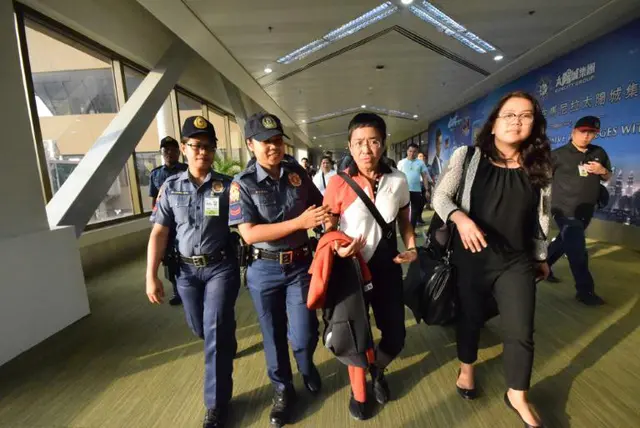Park Geun-hye took office as South Korea's first female president on Monday.
In her inauguration speech, Park promised to revive the country's slowing economy and promote her country's culture across the globe.
Speaking to an audience of about 70,000 people at the National Assembly plaza, Park also emphasized the importance of trust-building with partners in dealing with security challenges.
Three core tasks
"As president of the Republic of Korea, I will live up to the will of the people by achieving economic rejuvenation, the happiness of the people, and the flourishing of our culture," Park said.
South Korean President Park Geun-hye takes an oath during her inauguration ceremony in Seoul, South Korea, Feb. 25, 2013. Park Geun-hye, the daughter of South Korea's late military strongman Park Chung-Hee, was sworn in as the country's first female president on Monday. (Xinhua/Park Jin Hee)
To no one's surprise, the economy came on top of Park's agenda. She noted that the global economy is still disturbed by various factors and markets are faced with new challenges.
The 61-year-old president said her government would put more resources into creative industries and promote "economic democratization," which would impose restrictions on industry giants and offer more support for small and medium-sized enterprises.
Park said she is committed to "rooting out various unfair practices and rectifying the misguided habits of the past which have frustrated small business owners and small and medium-sized enterprises."
She said she wants to make a nation where "everyone can live up to their fullest potential, regardless of where they work or what they do for a living."
South Korean President Park Geun-hye attends a dinner after inauguration ceremony in Seoul, South Korea, Feb. 25, 2013. (Xinhua/Chung Sung-Jun)
To increase national happiness, Park said the government would make efforts to alleviate citizens' concern on such problems as education, employment, housing, and elderly care.
She also highlighted the significance of national culture, saying its popularity around the world will serve as a locomotive for the development of South Korea's economy.
Security Challenges
Aside from painting a more detailed picture of her economic policy design, Park also focused part of her speech on the country's northern neighbor.
She said that the Democratic People's Republic of Korea, which recently defied international warnings by conducting an underground nuclear test, would end up as the biggest victim if it continues to pursue nuclear capabilities.
"I urge the DPRK to abandon its nuclear ambitions without delay and embark on the path to peace and shared development," she said.
At the same time, she reaffirmed her pledge to seek a so-called "trust-building process" between the two sides to "lay the groundwork for an era of harmonious unification."
"Trust can be built through dialogue and by honoring promises that have already been made," Park said.
Observers said these remarks showed that the new government still hopes to resolve the Korean Peninsula nuclear issue via dialogue, despite the recent DPRK nuclear test.
South Korean President Park Geun-hye (2nd L, front) shakes hands with a guest during a dinner after the inauguration ceremony at presidential house in Seoul, South Korea, Feb. 25, 2013。 (Xinhua/Chung Sung-Jun/Getty Images)
To ease the tensions arising from the nuclear test, Park said she would expand cooperation with related parties and strive to increase mutual trust with the United States, China, Japan and Russia.
 简体中文
简体中文

